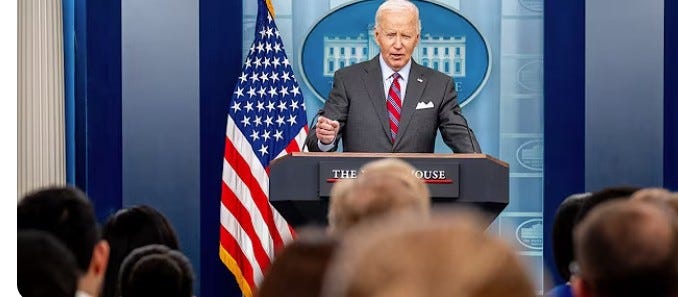Under the radar of war in the Middle East, the presidential election, and Donald Trump’s hush money trial in a Manhattan courtroom (not to mention his unhinged social media postings), the House of Representatives is paralyzed over a $95 billion supplemental bill to assist Ukraine. The beleaguered Ukrainians are desperate and running out of needed resources, especially ammunition, to stave off Vladimir Putin’s forces.
The Senate passed the aid measure with ease, but the ascendant pro-Putin wing of the Republican Party is holding it hostage in the House, where it would pass were it brought to a vote. But conservative extremists led by Representative Marjorie Taylor Greene of Georgia and Douglas Massie of Kentucky are threatening to oust House Speaker Mike Johnson if he holds a vote. Johnson is in a bind since the GOP House majority is down to a single seat, depending on the day of the week, as members resign before the end of their term. That leaves Johnson vulnerable to a “motion to vacate” the chair, which would oust him just as former House Speaker Kevin McCarthy of California was defenestrated last year, assuming no Democrats stepped in to save him. Johnson, though, is pressing ahead with an aid vote. Actually, he has proposed holding four separate votes rather than one on the big Senate package, including discrete aid measures for Israel, Taiwan, and Ukraine, which could come as soon as this week but maybe next week if the chamber delays a scheduled recess.
Democrats are likely committed to propping up Johnson if he puts the bill forward without too many poison pills. Trump and his close allies have proposed changing the $95 billion aid into a smaller $60 billion loan, but it is unclear if this proposal is meant seriously or as a way to stall while Ukraine’s forces struggle.
To most Americans this quarrel may seem like inside baseball. But the consequences for America and the world are enormous. A Russian victory over Kyiv, which is entirely possible if American aid is not forthcoming, would embolden authoritarians around the globe, encourage Moscow’s expansionism, and lead to cataclysmic suffering for Ukraine beyond what the nation has already endured.
It may sound outlandish to normie voters, but an increasingly large number of Republicans are big fans of Putin and want America to look more like Russia, not the other way around. To the Trump right, Putin’s Russia, like Viktor Orban’s Hungary, is seen as an anti-LGBTQ, patriarchal, pro-oil, anarcho-capitalist, anti-woke, Christian nationalist state they wish America could be. The Russian strongman is their beau ideal of a leader, and Republican politicians like Ted Cruz have shared videos of macho posturing Russian military propaganda to denigrate America’s own supposedly woke armed forces. The GOP base is drowning in anti-Ukraine rhetoric. Fox News’ former star host, Tucker Carlson, actively wants Russia to win the war.
Trump himself has both corrupt and ideological incentives to help Putin and Russia. The former president’s business ties with Russian oligarchs are well documented, but they also share a worldview. Trump finds democracy messy, likes authoritarianism, and wants to be a dictator himself.
Trump would turn the United States into a right-wing authoritarian state where theocrats run social policy, oil companies dominate energy policy, and big business runs economic policy. He and Putin both want to carve up the world between America, Russia, and other far-right governments into spheres of influence. They want to destroy NATO and the liberal international order and destabilize liberal democratic leaders in favor of like-minded tyrants. Both Putin and Trump would turn their respective countries into isolationist fortresses explicitly hostile to immigration, cosmopolitanism, human rights, or the defense of vulnerable democracies such as the Baltic states.
Many old-school Republicans, like former Representative Liz Cheney, balk at this vision of the future. There are still enough Congressional Republicans to pass aid to Ukraine and Taiwan with Democratic support, but they are rapidly being eclipsed by the pro-Putin faction. Last week, House Intelligence Committee Chair Mike Turner of Ohio, a supporter of Ukraine aid, told CNN’s Jake Tapper that Russian propaganda has “absolutely” seeped into the comments of some of his GOP colleagues. Earlier this month, House Foreign Affairs Committee Chair Michael McCaul of Texas, who also favors assistance to Kyiv, told Puck’s Julia Ioffe that Russian propaganda had “infected a good chunk of my party’s base.” Senate Minority Leader Mitch McConnell expressly cited this divide as one of the reasons for his looming retirement from leadership at year’s end.
If the GOP House cuts off aid to Ukraine, it will be complicit in a Russian victory. Putin will almost certainly move on to other conquests by force and by subterfuge. In addition to holding Crimea and much of Eastern Ukraine, Moscow is still occupying territory in Georgia and Moldova.
Should Trump be reelected, the world will be shrouded in a global axis of far-right authoritarianism. But this could not just be the struggle of a single generation. As artificial intelligence technology develops exponentially, the information ecosystem in which it grows and the values it is trained in could shape human societies around the globe for a long time to come.
Passing assistance for Ukraine quickly—and ensuring that the beleaguered European nation does not fall under Putin’s control—could determine the fate of the world for decades to come.











